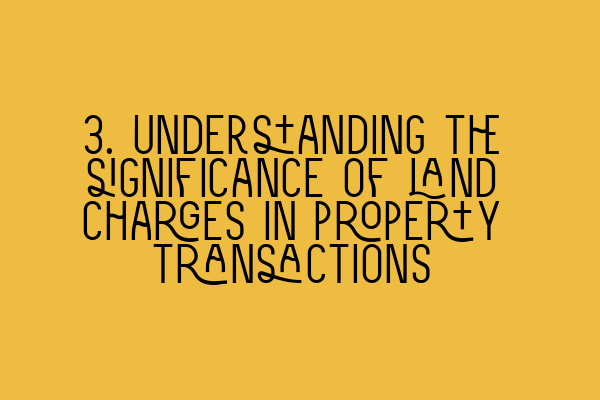Understanding the significance of land charges in property transactions
When it comes to property transactions, there are various legal considerations that must be taken into account. One such consideration is the presence of land charges. Land charges are an essential aspect of property law and play a significant role in determining the rights and obligations associated with a particular piece of land.
In this blog post, we will explore the significance of land charges in property transactions and why it is crucial for solicitors and individuals involved in property law to have a solid understanding of this concept. So, let’s dive in and explore this fascinating topic in more detail.
Firstly, what are land charges? Land charges are restrictions or encumbrances that are placed on a property or piece of land. These charges are registered with the Land Charges Registry, which is maintained by HM Land Registry. The purpose of registering land charges is to provide notice to potential buyers or mortgage lenders about any interests or obligations that may affect the property in question.
Land charges can take various forms, including restrictive covenants, equitable easements, and equitable charges. Each type of land charge has its own implications and can impact the enjoyment and use of the land. For example, a restrictive covenant may restrict certain activities or developments on the property, while an equitable easement may grant certain rights of way or access to adjacent land.
So, why are land charges significant in property transactions? The answer lies in the concept of priority. When multiple interests or charges exist on a property, determining their priority becomes crucial in order to ascertain the rights and obligations of each party involved.
Priority refers to the order in which different interests or charges take effect. In other words, it determines who has the superior claim over the property. The priority of land charges is generally determined by the date of registration, with earlier registrations taking precedence over subsequent ones.
Understanding the priority of land charges is vital for both buyers and mortgage lenders. For buyers, it ensures that they are aware of any existing obligations or restrictions on the property they are purchasing. This knowledge allows them to make informed decisions based on their intended use of the property.
Mortgage lenders, on the other hand, rely on the priority of land charges to assess the risk associated with lending against a particular property. They need to ensure that their mortgage takes priority over other interests or charges, as this offers them greater protection in the event of default or foreclosure.
For solicitors practicing property law, having a comprehensive understanding of land charges is indispensable. They must be able to identify and assess the implications of different types of land charges on a property. This knowledge allows them to advise their clients effectively and ensure that all necessary legal requirements are met during property transactions.
In conclusion, land charges are a critical aspect of property transactions. They provide valuable information about the rights and obligations associated with a particular property and allow parties involved to make informed decisions based on their intended use. Recognizing the significance of land charges and acquiring a solid understanding of this concept is of utmost importance for solicitors and individuals involved in property law.
If you’re interested in furthering your knowledge of property law or preparing for the SQE 1 or SQE 2 exams, feel free to explore our related articles and courses:
– SQE 1 Practice Exam Questions
– SQE 1 Practice Mocks FLK1 FLK2
– SQE 2 Preparation Courses
– SQE 1 Preparation Courses
– SRA SQE Exam Dates
At SQE Property Law & Land Law, we offer comprehensive courses and resources to help you succeed in your legal career. Whether you’re a solicitor in need of continued professional development or a student preparing for the SQE exams, our expert team is here to support you every step of the way. Contact us today to learn more about how we can assist you.
